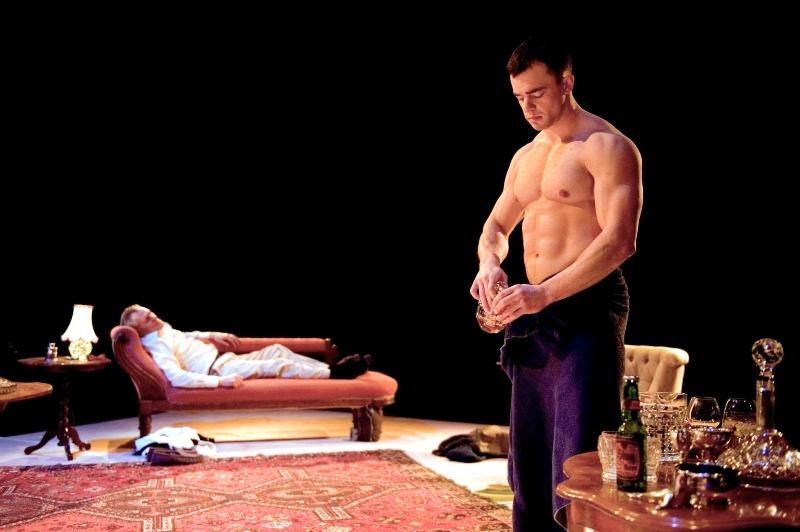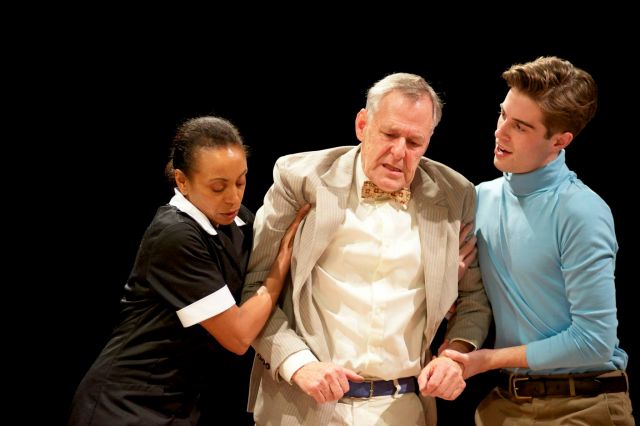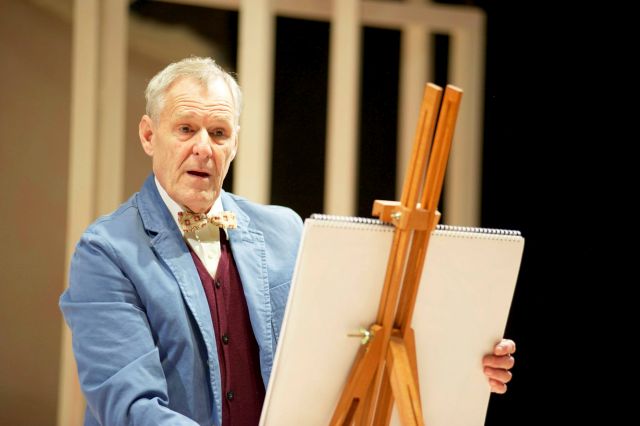Gods and Monsters, Southwark Playhouse | reviews, news & interviews
Gods and Monsters, Southwark Playhouse
Gods and Monsters, Southwark Playhouse
New play about the last days of 1930s Hollywood director James Whale

There is indeed something of Frankenstein’s monster about the handsome young gardener, with his flat-top haircut and gym-bulked torso, who has come to mow James Whale’s lawn.
The material comes from a speculative novel by Christopher Bram, which in turn inspired a 1998 film, with Ian McKellen Oscar-nominated as Whale – a pointed piece of casting given Whale’s sexuality: he was openly gay in an era when Hollywood barely had a name for such a thing. Labey’s play differs from the film in several respects, not least its refusal to present the developing relationship between the failing older man and the buff young groundsman as a romance. This James Whale (a convincingly tetchy and self-pitying Ian Gelder) has long since abandoned hope of consensual fumbling, let alone love.
 We first meet him in 1957 as he is importuned by an over-eager film student (a standout debut from Joey Phillips, pictured right with Gelder) wanting to interview him at his home. This expository Q&A is just starting to feel clunky when Whale suddenly demands that the boy remove an item of clothing in payment for each answer. (“I do hope you’re wearing a vest today or we’ll break the bank very soon”.) The excitement of the debagging prompts in the old man what stroke doctors call an ischaemic incident: lights flash, white noise crackles, and Whale is transported to a memory of his first sexual encounter, at an evening school art class in Dudley, the West Midlands, pre-First World War. Such flashbacks, and there are many, are cleverly achieved on Southwark’s three-sided playing space, lit by Mike Robertson. We’re never in doubt what’s going on or who’s who (the accents are a reliable guide), at least not until the second half, when Labey (directing his own play) bizarrely takes it into his head to switch the casting of the younger Whale from Phillips to Will Rastall, who had previously played the friend or lover.
We first meet him in 1957 as he is importuned by an over-eager film student (a standout debut from Joey Phillips, pictured right with Gelder) wanting to interview him at his home. This expository Q&A is just starting to feel clunky when Whale suddenly demands that the boy remove an item of clothing in payment for each answer. (“I do hope you’re wearing a vest today or we’ll break the bank very soon”.) The excitement of the debagging prompts in the old man what stroke doctors call an ischaemic incident: lights flash, white noise crackles, and Whale is transported to a memory of his first sexual encounter, at an evening school art class in Dudley, the West Midlands, pre-First World War. Such flashbacks, and there are many, are cleverly achieved on Southwark’s three-sided playing space, lit by Mike Robertson. We’re never in doubt what’s going on or who’s who (the accents are a reliable guide), at least not until the second half, when Labey (directing his own play) bizarrely takes it into his head to switch the casting of the younger Whale from Phillips to Will Rastall, who had previously played the friend or lover.
 Meanwhile, back in 1957 (though you sometimes doubt the dialogue’s authenticity – did folks back then say ‘I couldn’t be arsed’?), Gelder's Whale (pictured left) has persuaded the beefcake gardener, Clayton Boone (Will Austin, another newcomer), to pose for his life-drawing sessions. Boone, slow on the uptake, doesn’t clock Whale’s game, and the strip-tease of repeated sittings and Whale's wheedling for him to bare more flesh make these scenes painfully slow. The female perspective is briskly presented by the Spanish housekeeper, Maria (Lachele Carl), whose genuine kindness to the old man is clear, despite her purse-lipped disapproval of his lifestyle.
Meanwhile, back in 1957 (though you sometimes doubt the dialogue’s authenticity – did folks back then say ‘I couldn’t be arsed’?), Gelder's Whale (pictured left) has persuaded the beefcake gardener, Clayton Boone (Will Austin, another newcomer), to pose for his life-drawing sessions. Boone, slow on the uptake, doesn’t clock Whale’s game, and the strip-tease of repeated sittings and Whale's wheedling for him to bare more flesh make these scenes painfully slow. The female perspective is briskly presented by the Spanish housekeeper, Maria (Lachele Carl), whose genuine kindness to the old man is clear, despite her purse-lipped disapproval of his lifestyle.
You emerge from Gods and Monsters with a fair biographical knowledge of James Whale – learning that he was responsible for the long-delayed staging of that First World War gem, Journey’s End, at once endeared him to me – but not much about a gay director’s life during Hollywood’s Golden Era, nor the depressing after-effects of stroke. Jason Denvir’s set design, of walls and floors painted pale and veiny like the surface of a brain, suggest a textual intention that petered out somewhere along the line. At one point, Whale describes the moment he created the iconic look of Frankenstein’s monster in 1933: “a flat-topped head, like a tin of beef”. The idea that we might open the lid, as it were, and peer into the tangle of memories, desires and sensitivities contained within, is appealing. It’s what this play half-achieves.
rating
Buy
Explore topics
Share this article
The future of Arts Journalism
You can stop theartsdesk.com closing!
We urgently need financing to survive. Our fundraising drive has thus far raised £49,000 but we need to reach £100,000 or we will be forced to close. Please contribute here: https://gofund.me/c3f6033d
And if you can forward this information to anyone who might assist, we’d be grateful.

Subscribe to theartsdesk.com
Thank you for continuing to read our work on theartsdesk.com. For unlimited access to every article in its entirety, including our archive of more than 15,000 pieces, we're asking for £5 per month or £40 per year. We feel it's a very good deal, and hope you do too.
To take a subscription now simply click here.
And if you're looking for that extra gift for a friend or family member, why not treat them to a theartsdesk.com gift subscription?
more Theatre
 Hedda, Orange Tree Theatre review - a monument reimagined, perhaps even improved
Scandinavian masterpiece transplanted into a London reeling from the ravages of war
Hedda, Orange Tree Theatre review - a monument reimagined, perhaps even improved
Scandinavian masterpiece transplanted into a London reeling from the ravages of war
 The Assembled Parties, Hampstead review - a rarity, a well-made play delivered straight
Witty but poignant tribute to the strength of family ties as all around disintegrates
The Assembled Parties, Hampstead review - a rarity, a well-made play delivered straight
Witty but poignant tribute to the strength of family ties as all around disintegrates
 Mary Page Marlowe, Old Vic review - a starry portrait of a splintered life
Tracy Letts's Off Broadway play makes a shimmeringly powerful London debut
Mary Page Marlowe, Old Vic review - a starry portrait of a splintered life
Tracy Letts's Off Broadway play makes a shimmeringly powerful London debut
 Little Brother, Soho Theatre review - light, bright but emotionally true
This Verity Bargate Award-winning dramedy is entertaining as well as thought provoking
Little Brother, Soho Theatre review - light, bright but emotionally true
This Verity Bargate Award-winning dramedy is entertaining as well as thought provoking
 The Unbelievers, Royal Court Theatre - grimly compelling, powerfully performed
Nick Payne's new play is amongst his best
The Unbelievers, Royal Court Theatre - grimly compelling, powerfully performed
Nick Payne's new play is amongst his best
 The Maids, Donmar Warehouse review - vibrant cast lost in a spectacular-looking fever dream
Kip Williams revises Genet, with little gained in the update except eye-popping visuals
The Maids, Donmar Warehouse review - vibrant cast lost in a spectacular-looking fever dream
Kip Williams revises Genet, with little gained in the update except eye-popping visuals
 Ragdoll, Jermyn Street Theatre review - compelling and emotionally truthful
Katherine Moar returns with a Patty Hearst-inspired follow up to her debut hit 'Farm Hall'
Ragdoll, Jermyn Street Theatre review - compelling and emotionally truthful
Katherine Moar returns with a Patty Hearst-inspired follow up to her debut hit 'Farm Hall'
 Troilus and Cressida, Globe Theatre review - a 'problem play' with added problems
Raucous and carnivalesque, but also ugly and incomprehensible
Troilus and Cressida, Globe Theatre review - a 'problem play' with added problems
Raucous and carnivalesque, but also ugly and incomprehensible
 Clarkston, Trafalgar Theatre review - two lads on a road to nowhere
Netflix star, Joe Locke, is the selling point of a production that needs one
Clarkston, Trafalgar Theatre review - two lads on a road to nowhere
Netflix star, Joe Locke, is the selling point of a production that needs one
 Ghost Stories, Peacock Theatre review - spirited staging but short on scares
Impressive spectacle saves an ageing show in an unsuitable venue
Ghost Stories, Peacock Theatre review - spirited staging but short on scares
Impressive spectacle saves an ageing show in an unsuitable venue
 Hamlet, National Theatre review - turning tragedy to comedy is no joke
Hiran Abeyeskera’s childlike prince falls flat in a mixed production
Hamlet, National Theatre review - turning tragedy to comedy is no joke
Hiran Abeyeskera’s childlike prince falls flat in a mixed production
 Rohtko, Barbican review - postmodern meditation on fake and authentic art is less than the sum of its parts
Łukasz Twarkowski's production dazzles without illuminating
Rohtko, Barbican review - postmodern meditation on fake and authentic art is less than the sum of its parts
Łukasz Twarkowski's production dazzles without illuminating

Add comment